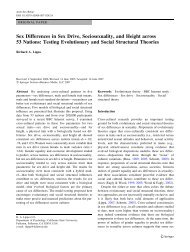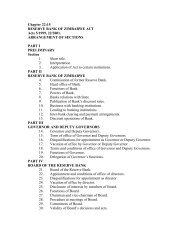- Page 1 and 2:
Part I 110 FCC-Recorded Scripts #1
- Page 3 and 4:
That Slavic fatalism which induced
- Page 5 and 6:
And Pierre Laval was about all that
- Page 7 and 8:
thousands I was not interested in i
- Page 9 and 10:
Vivaldi had done it. I have a high
- Page 11 and 12:
Hiler is paintin’, and to git kum
- Page 13 and 14:
Three centuries, to get people to u
- Page 15 and 16:
the first person singular. Nick wan
- Page 17 and 18:
Abraham Lincoln, not quoting old Ab
- Page 19 and 20:
Hence the senile outcry Europa-Dele
- Page 21 and 22:
Laval saved Paris. Churchill would
- Page 23 and 24:
evolutions Worked out a new system
- Page 25 and 26:
he has done so now. Tho’ he could
- Page 27 and 28:
nuisance in the White House than sn
- Page 29 and 30:
Constitution which even the ordinar
- Page 31 and 32:
English friend I got in the world,
- Page 33 and 34:
A glance at Japanese sword guards,
- Page 35 and 36:
unteachable. I don’t know whether
- Page 37 and 38:
And then another 80 years: to the E
- Page 39 and 40:
#8 (February 10, 1942) U.S.(A69) TH
- Page 41 and 42:
Yes, I know what the decent English
- Page 43 and 44:
John Marmaduke is a pseudonym, the
- Page 45 and 46:
Third vice-gerent of the First Abdu
- Page 47 and 48:
One hundred thousand violent crimes
- Page 49 and 50:
autumn, who is he to impede human c
- Page 51 and 52:
and then cheated Italy. It was an e
- Page 53 and 54:
We should be very careful in arrivi
- Page 55 and 56:
for the expression, impoverishment
- Page 57 and 58:
hold of Russia and turned the whole
- Page 59 and 60:
Thirty years intensive production o
- Page 61 and 62:
aw material. Deliver so many carloa
- Page 63 and 64:
And IGNORANCE and feeding on lies w
- Page 65 and 66:
show how it loved Italy was to lie
- Page 67 and 68:
not on stuff other folks want to bu
- Page 69 and 70:
Well, his namesake and 84th generat
- Page 71 and 72:
And Winston ? He toppled over Japan
- Page 73 and 74:
Kipling once wrote, “Jack Barret
- Page 75 and 76:
untie it. If he were a Scotchman, h
- Page 77 and 78:
Cheap grain dumped from Egypt, ruin
- Page 79 and 80:
And it is for this filth that you f
- Page 81 and 82:
There is a poem, not by me, back in
- Page 83 and 84:
Printed in Wisconsin in the spring
- Page 85 and 86:
DREADFUL man!” Seems like she had
- Page 87 and 88:
I assume that there was a tiny, and
- Page 89 and 90:
There is NO mystery whatsoever abou
- Page 91 and 92:
You do NOT believe in the abolition
- Page 93 and 94:
have NOT made it a war of honor. Yo
- Page 95 and 96:
The aesthetic angle, that the whole
- Page 97 and 98:
it, you can start by cleaning up yo
- Page 99 and 100:
Connect ’em up. THINK what might
- Page 101 and 102:
gold in the world is in the United
- Page 103 and 104:
tent to receive Morgenthau dollars
- Page 105 and 106:
into North America to the ruin of N
- Page 107 and 108:
I think Roosevelt ought to be jaile
- Page 109 and 110:
ticket takes his chance with the ot
- Page 111 and 112:
was wreathed in smiles, I declined
- Page 113 and 114:
that had 100, whether they will hav
- Page 115 and 116:
But the question SUBSISTS ? WHY did
- Page 117 and 118:
In the Middle Ages they got a bit f
- Page 119 and 120:
Waaal, can’t get it all into one
- Page 121 and 122:
come here and tell papa. I can’t
- Page 123 and 124:
As for the English, nine of ’em o
- Page 125 and 126:
Now what do you think causes that?
- Page 127 and 128:
and Judge Republican, back in 1892.
- Page 129 and 130:
series of editions (Flammarion edit
- Page 131 and 132:
England was trying to bully NEW Ita
- Page 133 and 134:
Yes, we HAVE in the United States s
- Page 135 and 136:
on the London gold exchange, six fi
- Page 137 and 138:
mind with blastoderms and sources o
- Page 139 and 140:
I take it in retrospect that my ten
- Page 141 and 142:
of Victorian (jubilee). Lucre does
- Page 143 and 144:
DIFFERENT kinds of people was BUST,
- Page 145 and 146:
There is an Italian motto—spectam
- Page 147 and 148:
No one in the United States will be
- Page 149 and 150:
some real evidence. There is a buil
- Page 151 and 152:
I propose to consider the statement
- Page 153 and 154:
means unto vengeance. AIMED specifi
- Page 155 and 156:
my war all right, I have been in it
- Page 157 and 158:
ill slid thru, knocking out silver.
- Page 159 and 160:
Precarious, in the common sense, I
- Page 161 and 162:
knaves, who are usually part simple
- Page 163 and 164:
One of the jobs I took on way back
- Page 165 and 166:
now what was CAUSIN’ this, what w
- Page 167 and 168:
La prochaine sera la derniere. Gni
- Page 169 and 170:
he was writing and printing: the DE
- Page 171 and 172:
tradition. One complains that it is
- Page 173 and 174:
and discovers what was long since k
- Page 175 and 176:
endured hardships I have not, why s
- Page 177 and 178:
eckon Hitler has been lied about mo
- Page 179 and 180:
Adolf did do something about it, wh
- Page 181 and 182:
a contribution to the world literat
- Page 183 and 184:
Now in part Mr. Cummings teaches a
- Page 185 and 186:
heart and azure man with his sky in
- Page 187 and 188:
I have spoken before of Mr. Bridson
- Page 189 and 190:
Free speech, as I have said, is NO
- Page 191 and 192:
years, to show that England has one
- Page 193 and 194:
If there is anyone capable of serio
- Page 195 and 196:
Are you incapable of noticing anyth
- Page 197 and 198:
Such a statement any time in the la
- Page 199 and 200:
crux or the issue. You possibly can
- Page 201 and 202:
avoiding the basic issues. And if M
- Page 203 and 204:
will not go back down under the usu
- Page 205 and 206:
My COMpliments on your acumen. But
- Page 207 and 208:
the hoof with eight reindeer. And w
- Page 209 and 210:
ALL American history from the koshe
- Page 211 and 212:
And then come the Civil War. And th
- Page 213 and 214:
Ezra Pound at the microphone. Why d
- Page 215 and 216:
RACIALLY English sat in Rural Engla
- Page 217 and 218:
Let your Brain Trust (or monopoly)
- Page 219 and 220:
For my part thought that Americans
- Page 221 and 222:
All the means of intercommunication
- Page 223 and 224:
Is it too late to inquire, is inqui
- Page 225 and 226:
And any man’s clarity must start
- Page 227 and 228:
And that gold chemistry is studied
- Page 229 and 230:
difference between money and credit
- Page 231 and 232:
whatever, how can you understand HO
- Page 233 and 234:
is between the common, preferred, p
- Page 235 and 236:
#50 (June 28, 1942) U.K.(B64) THE G
- Page 237 and 238:
And nothing HAS contented them save
- Page 239 and 240:
professors and so called economists
- Page 241 and 242:
the two Americans who lit up the ho
- Page 243 and 244:
an ecciesiast central; already corr
- Page 245 and 246:
to DO anything, let alone resist a
- Page 247 and 248:
They will not be tomorrow’s Hemin
- Page 249 and 250:
augment as people lose an ethical b
- Page 251 and 252:
Ezra Pound speaking. I know I haven
- Page 253 and 254:
on a professorial conference of sev
- Page 255 and 256:
the cathedrals in Romanesque style,
- Page 257 and 258:
That is the way the alien race worm
- Page 259 and 260:
London School of Economics products
- Page 261 and 262:
Given a little more knowledge, give
- Page 263 and 264:
of races, of racial strains, but be
- Page 265 and 266:
folks want to keep it rusty and ine
- Page 267 and 268:
we had had it. But handy and useful
- Page 269 and 270:
I can’t believe the sons or desce
- Page 271 and 272:
uin of British cattle grazing. Brit
- Page 273 and 274:
England seem to me rather to fall s
- Page 275 and 276:
can put the blame on the climate. W
- Page 277 and 278:
churches. Or all tolerated BY the C
- Page 279 and 280:
As I came here tonight I bought an
- Page 281 and 282: HENCE his alliance with the bishops
- Page 283 and 284: If you can’t do it yourself, no o
- Page 285 and 286: Europe and Back to Asia. And the tr
- Page 287 and 288: #61 (February 19, 1943) U.S.(C9) TH
- Page 289 and 290: Panama and in Palestine, ask: does
- Page 291 and 292: Mr. Wallace, before he ruins his br
- Page 293 and 294: power of French finance. Looking to
- Page 295 and 296: heard this view for the first time
- Page 297 and 298: economic system. Only it isn’t. I
- Page 299 and 300: mankind apparently can NOT grasp ac
- Page 301 and 302: illiance, but that the interesting
- Page 303 and 304: When Cromwell betrayed the British
- Page 305 and 306: Your own press and your own native
- Page 307 and 308: Do you recognize the source of the
- Page 309 and 310: digested Brooks Adams taking the gr
- Page 311 and 312: As you have discovered, at least so
- Page 313 and 314: the general American really KNOWS i
- Page 315 and 316: Some of ’em thought Mr. Gallup’
- Page 317 and 318: people are asked to elect him. John
- Page 319 and 320: I treat information from the U.S. a
- Page 321 and 322: Burlington Arcade collars and ties
- Page 323 and 324: Ain’t it WOnderful, watchu waitin
- Page 325 and 326: Asquith lift up her wail in protest
- Page 327 and 328: London and Washington, that helps t
- Page 329 and 330: circulation in relation to goods, o
- Page 331: not understand economics. It has be
- Page 335 and 336: have not mentioned in preceding com
- Page 337 and 338: favors from all applicants who are
- Page 339 and 340: That just won’t do; and the Times
- Page 341 and 342: am trying, still patiently trying t
- Page 343 and 344: mankind into accepting certain frau
- Page 345 and 346: #75 (April 13, 1943) U.S.(C29) VALE
- Page 347 and 348: Said, or as they say “sang,” th
- Page 349 and 350: e a man of the highest type of poli
- Page 351 and 352: his chief advisors if elected? Ther
- Page 353 and 354: Now it can’t be said that England
- Page 355 and 356: Someone in England insisted on havi
- Page 357 and 358: industrialists, capitalists and the
- Page 359 and 360: #79 (April 24, 1943) U.S.(C34) CONS
- Page 361 and 362: Mme. Chiang arouses one’s sympath
- Page 363 and 364: A chair has been founded in the Sor
- Page 365 and 366: Brown. They will have no effect upo
- Page 367 and 368: to attend him; he said: turn out th
- Page 369 and 370: NO, not even that, he wants the rig
- Page 371 and 372: Well, in a way, and in a way NOT. F
- Page 373 and 374: marriages. You needn’t proclaim y
- Page 375 and 376: is almost impossible to get anyone
- Page 377 and 378: I don’t know why you don’t shoo
- Page 379 and 380: subtracted from making things you W
- Page 381 and 382: Immunity from economic aggression m
- Page 383 and 384:
Italy was resistin’ absolute slav
- Page 385 and 386:
toil more or less consecutively to
- Page 387 and 388:
The reasons Germany’s allies can
- Page 389 and 390:
e saved for you by Willie Bullitt,
- Page 391 and 392:
inspection. Even Mr. William Bullit
- Page 393 and 394:
program or do they occur in some wo
- Page 395 and 396:
Toledo, that he was over here to ge
- Page 397 and 398:
hetoric. It is very easy for people
- Page 399 and 400:
confusing because there are two set
- Page 401 and 402:
France did not create Latinism. And
- Page 403 and 404:
over? If so, can the State Departme
- Page 405 and 406:
The corporate state is a state in w
- Page 407 and 408:
However, not to raise undue prejudi
- Page 409 and 410:
again pay up on anything, the aim,
- Page 411 and 412:
Constantinople sent over to see [wh
- Page 413 and 414:
Yes, Yes, and LINKS between the soc
- Page 415 and 416:
Why would he eat angel cake out of
- Page 417 and 418:
in dollars worth one bushel of whea
- Page 419 and 420:
It is now very hard to touch on suc
- Page 421 and 422:
than a strong personal taste for pe
- Page 423 and 424:
But as my compatriots are now ruled
- Page 425 and 426:
this time there will be no competit
- Page 427 and 428:
utter asses to be diddled by the Mo
- Page 429 and 430:
chief noise, the chief blather shou
- Page 431 and 432:
people who use different languages,
- Page 433 and 434:
up the subject. It is a non-politic
- Page 435 and 436:
een a serious character SOONER, he
- Page 437 and 438:
MATERIALLY better off than the Russ
- Page 439 and 440:
line, with this dissolution of inte
- Page 441 and 442:
OH, that they vary the currency, th
- Page 443 and 444:
was also accused of having brighten
- Page 445 and 446:
into the mire of Slavic chaos (with
- Page 447 and 448:
Oh, but the new money will not be m
- Page 449 and 450:
Mr. Keynes will explain. He will ha
- Page 451 and 452:
Harriet Martineau and President Mad
- Page 453 and 454:
forward, I mean when he spoke of ec
- Page 455 and 456:
Sumner, and Mr. Agar expect the Ame
- Page 457 and 458:
tank can make a good deal of head w
- Page 459 and 460:
the manuscript so as to show what w
- Page 461 and 462:
Demeter. You may remember that Doc.
- Page 463 and 464:
Some of you MUST stand back now and
- Page 465 and 466:
to be your sense of equity? Has it
- Page 467 and 468:
past kind of pacifist, the suppress
- Page 469 and 470:
MORE of it, they can change the sur
- Page 471 and 472:
talking about, let me say that half
- Page 473 and 474:
it for any one music in the wide an
- Page 475 and 476:
about the way the U.S. are built up
- Page 477 and 478:
Mrs. Ikestein, the tailor’s wife;
- Page 479 and 480:
Harry Stotl’s li’l book labeled
- Page 481 and 482:
I defend the particularly American,
- Page 483 and 484:
Morgenthau’s department? What fac
- Page 485 and 486:
For a decade or more, everyone NOT
- Page 487 and 488:
worse for England, as Japan would a
- Page 489 and 490:
him. And nearly everything Gibbs op
- Page 491 and 492:
or a landlord of my room in Church
- Page 493 and 494:
SECONDLY: Quisling observed that th
- Page 495 and 496:
OBVIOUSLY such a union would not ha
- Page 497 and 498:
knew more than any of ’em. Even W
- Page 499 and 500:
And dear ole Bill Woodward does NOT
- Page 501 and 502:
stage set, “hast given us the gat
- Page 503:
five times in the course of a life








